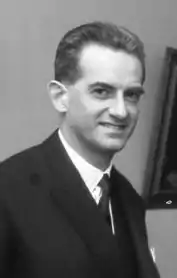Alain Peyrefitte
Alain Peyrefitte (French pronunciation: [alɛ̃ pɛʁfit]; 26 August 1925 – 27 November 1999) was a French scholar and politician. He was a confidant of Charles de Gaulle and had a long career in public service, serving as a diplomat in Germany and Poland.
Alain Peyrefitte | |
|---|---|
 Alain Peyrefitte, 1964 | |
| Minister of Justice | |
| In office 30 March 1977 – 22 May 1981 | |
| President | Valéry Giscard d'Estaing |
| Prime Minister | Raymond Barre |
| Preceded by | Olivier Guichard |
| Succeeded by | Maurice Faure |
| Personal details | |
| Born | 26 August 1925 Najac, France |
| Died | 27 November 1999 (aged 74) 16th arrondissement of Paris, France |
| Nationality | French |
| Alma mater | École normale supérieure École nationale d'administration |
Peyrefitte served as Minister of Information from 1962 to 1966, establishing the rules of presidential debates between the two electoral rounds; and as Minister of Justice from 1977 to 1981, being involved in the affair surrounding the mysterious death of Robert Boulin in 1979.
He became a member of the Académie française in 1977.
On 15 December 1986, he survived an assassination attempt by members of Action Directe (AD) in front of his house. The driver of his car was killed in the bomb attack.[1]
Upon his death in 1999 he was honored by burial in Les Invalides which also houses the tomb of Napoleon and other revered national leaders.
Books
He wrote The Immobile Empire[2] and fr:Quand la Chine s'éveillera… le monde tremblera. Outside France he is probably best known for his book Le Mal Français (translated as The Trouble with France), which addresses the question of whether there is something unique to the French character that has caused some of the country's peculiar recurring problems. The book places his own observations and experiences as a journalist and government minister inside a panoramic view of French and European history from the medieval to the modern era.
Political career
Governmental functions
Secretary of State for Information : April–September 1962.
Minister of Returnees : September–November 1962.
Minister of Information : 1962–1966.
Minister of Scientific Research and Atomic Questions and Space : 1966–1967.
Minister of Education : 1967–1968.
Minister for Administrative Reforms : 1973–1974.
Minister of Cultural Affairs and the Environment : March–May 1974.
Keeper of the seals, Minister of Justice : 1977–1981.
Electoral mandates
National Assembly of France
Member of the National Assembly of France for Seine-et-Marne : 1958–1962 (Became secretary of State in 1962) / Reelected in 1967, but he stays minister / 1968–1973 (Became minister in 1973) / 1974–1977 (Became minister in 1977) / Reelected in 1978, but he stays minister / 1981–1995 (Became senator in 1995). Elected in 1958, reelected in 1962, 1967, 1968, 1973, 1974, 1978, 1981, 1986, 1988, 1993.
Senate of France
Senator of Seine-et-Marne : 1995–1999 (He died in 1999). Elected in 1995.
General Council
Vice-president of the General council of Seine-et-Marne : 1982–1988.
General councillor of Seine-et-Marne : 1964–1988. Reelected in 1970, 1976, 1982.
Municipal Council
Mayor of Provins : 1965–1997 (Resignation in 1997). Reelected in 1971, 1977, 1983, 1989, 1995.
Municipal councillor of Provins : 1965–1999 (He died in 1999). Reelected in 1971, 1977, 1983, 1989, 1995.
Honours
 Monaco : Commander of the Order of Cultural Merit (November 1999)[3]
Monaco : Commander of the Order of Cultural Merit (November 1999)[3] France : Commandeurs of the Ordre des Arts et des Lettres in September 1974[4]
France : Commandeurs of the Ordre des Arts et des Lettres in September 1974[4]
References
- https://www.universalis.fr/evenement/15-decembre-1986-attentat-manque-contre-alain-peyrefitte/
- (New York: Knopf: Distributed by Random House, 1992 ISBN 0-394-58654-9).
- Sovereign Ordonnance n° 14.274 of 18 Nov. 1999 : promotions or nominations
- Archives of the l'ordre des Arts et des Lettres.
- Alain Peyrefitte (1993) The collision of two civilisations: the British expedition to China in 1792–4, London: Harvill, ISBN 0-00-272677-7
| Political offices | ||
|---|---|---|
| Preceded by Olivier Guichard |
Minister of Justice 1977–1981 |
Succeeded by Maurice Faure |
| Preceded by Christian Fouchet |
Minister of National Education 1967–1968 |
Succeeded by François-Xavier Ortoli |